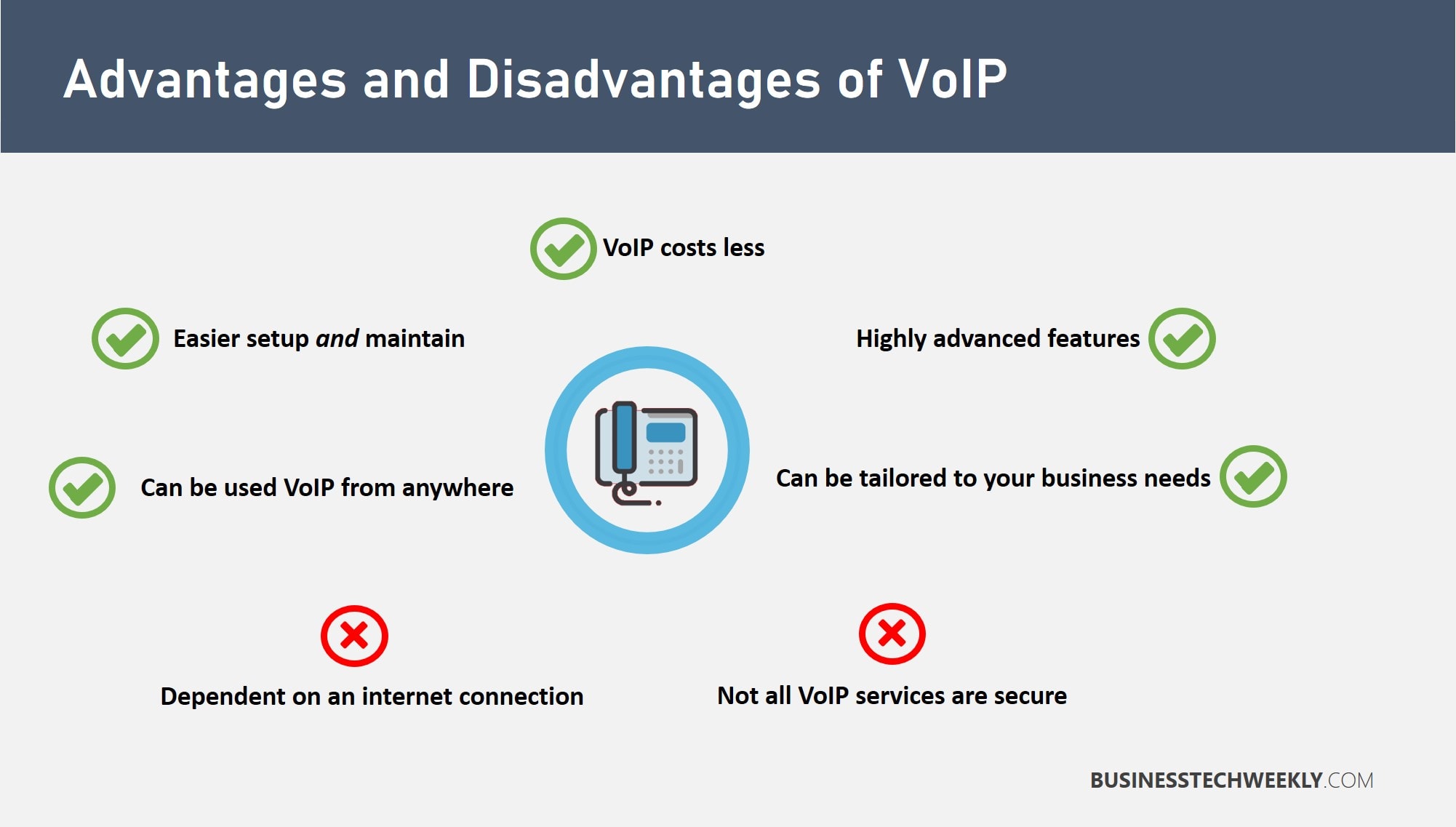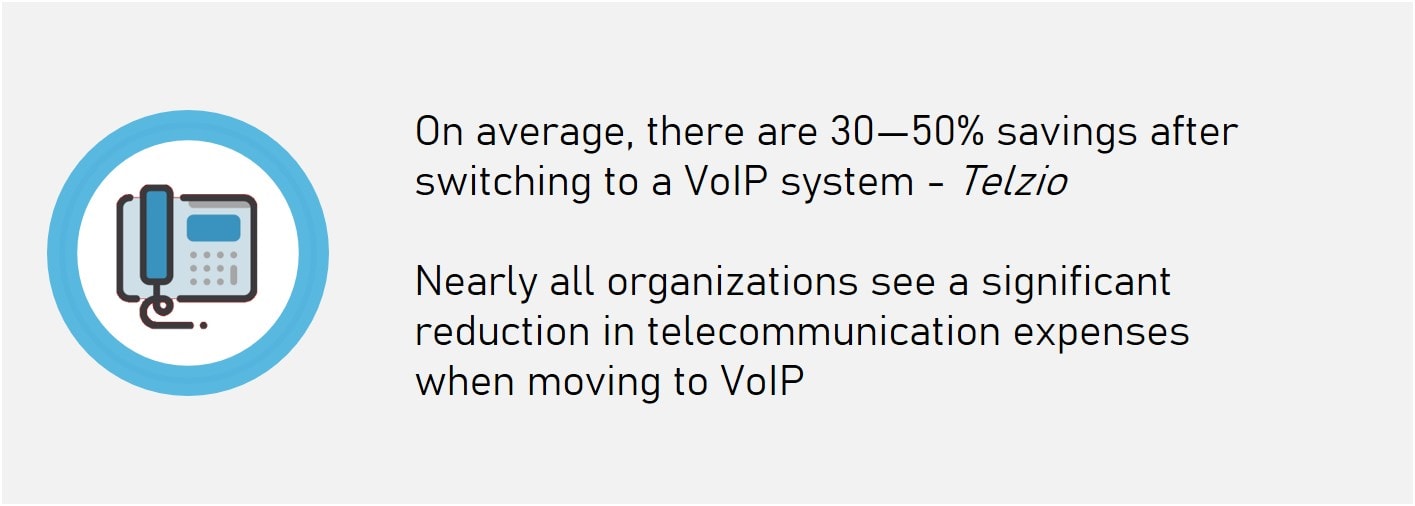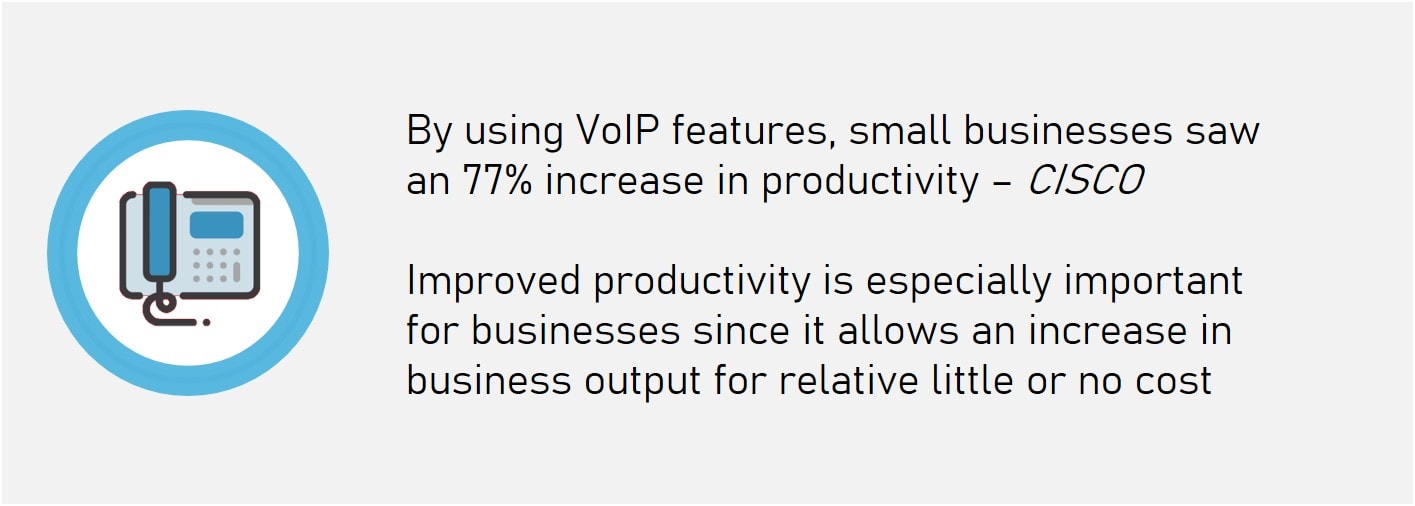Benefits of VoIP: What advantages does VoIP offer businesses?

Due to its versatility and flexibility, Voice over IP (VoIP) telephony is fast becoming the backbone of every growing and flourishing business. With the surge in popularity of VoIP, you may be considering whether it’s worth replacing your current phone system with an IP phone system? But what are the benefits of VoIP, and is it right for your business?
On this page:
Understanding VoIP
VoIP refers to a specific protocol, namely the internet protocol (IP), which is used to transmit and receive voice signals over the internet. You may have heard VoIP, or Voice over Internet Protocol, referred to as Business VoIP, Internet Telephony, Cloud PBX, Hosted VoIP, and several other similar-sounding terms. While all of these do use VoIP, from a technical perspective, they are slightly different. However, VoIP has become a catch-all term to describe internet-based voice communications. So, what is VoIP? VoIP telephony systems do not rely on traditional copper phone lines and instead operate over a broadband internet connection such as fiber or DSL to make and receive calls. Using the internet for voice calls has several advantages and disadvantages, leading to significant benefits for organizations by using VoIP.
How does VoIP work?
VoIP takes your voice, which is analog, and converts that signal into a digital format. Once compressed, it is sent to its destination via your high-speed internet connection to your VoIP provider. Here, the digitally formatted voice signal is transmitted to the Public Switch Telephone Network (PSTN) and then the eventual recipient. The ability of VoIP phone systems to utilize the internet to transmit voice signal provides several benefits to businesses. Before we look at the benefits offered by VoIP, let’s take a look at the advantages and disadvantages of VoIP.
VoIP Advantages and Disadvantages
By using the internet, VoIP offers several pros and cons:
Advantages of VoIP
- VoIP costs less – Compared with traditional phones services, VoIP services cost less. Traditional phone services typically entail high monthly fees for each physical phone line, as well as per-minute charges. These costs can mount, particularly for organizations that make long-distance and international calls. In contrast, because they leverage the internet, VoIP services are typically much less expensive.
- VoIP is easier setup and maintain – Most businesses already have an internet connection. VoIP services, particularly cloud-based VoIP phone systems, can operate over a business’ existing internet connection, avoiding the need for brand new equipment. At a minimum, you can start using VoIP using a softphone. Cloud VoIP is often offered on a software-as-a-service (SaaS) subscription model and includes all maintenance, upgrades and management of the service. You will only need to worry about any IP-desk phones that you require.
- Employees can use VoIP from anywhere – Well, almost anywhere. Provided your employees have an internet-enabled device and an internet connection, they take and make calls on their “work” phone numbers from anywhere.
- Highly advanced features – VoIP offers advanced features such as auto call answering, IVR, voicemail transcription, welcome message, and more, enabling you to tailor your organizational communication ability.
- VoIP services can be tailored to your needs – VoIP is not limited by physical copper wires, and you don’t have to maintain an onsite PBX or any physical hardware unless you need to. VoIP services can be easily expanded or contracted by adding lines, changing locations, or adding new telephone numbers as required.
Disadvantages of VoIP
- VoIP is dependent on an internet connection – For your VoIP phone service to function, you will need to ensure you have a reliable network and a high-bandwidth Internet connection. For most businesses, this isn’t a problem. However, network issues can lead to jittery or choppy voice calls. Business calls can still be made from a mobile device using cellular connections and a softphone in the event of an internet outage. However, it’s still worth keeping in mind as a potential drawback.
- Not all VoIP services are secure – Cybersecurity is at the forefront of many firms, and any system which uses the internet to transmit data is not necessarily secure. VoIP is no different, and taking steps to secure your VoIP telephony system, will minimize the likelihood of your organization suffering from any cyber-attacks.

Benefits of using VoIP for your business
For most organizations that have migrated to VoIP, the advantages have far outweighed any drawbacks. Such businesses see significant benefits by moving to VoIP based telephony services. Presented below are some of the drivers for migrating to VoIP and the benefits it provides:
Reduced operational costs
For most businesses, the most significant benefit they see after moving to VoIP is a reduction in operational costs. Businesses that migrate their telephony service to VoIP benefit from direct and indirect cost savings in several ways:
- Firstly, since VoIP uses an internet connection, businesses benefit from a direct cost saving compared to traditional telephony services.
- Secondly, as VoIP is easier to maintain, particularly Cloud-based VoIP, businesses don’t need to hire specialized staff to manage and administer VoIP, thereby benefiting from resource cost savings.
- Thirdly, since Cloud VoIP is offered as a SaaS subscription, businesses no longer need to budget for expensive upgrades or maintenance. These usually are included as part of the monthly subscription, offering businesses the opportunity to benefit from the reduced expenditure.
- Fourthly, VoIP provides organizations with the ability to have staff work remotely, a direct cost reduction in overhead, such as rent and utilities.
- Finally, there are the indirect cost savings businesses benefit from after deploying VoIP telephony. The other benefits offered by VoIP, such as improved productivity, increased mobility, and enhanced customer and employee experience, provide increased business output for little or no additional cost.

Increased Mobility & Agility
The versatility and flexibility offered by VoIP systems is a crucial benefit for many organizations, allowing them the capability to react to market trends and other external factors promptly. Businesses moving to VoIP can benefit from increased agility and mobility due to multiple factors:
- Scalability – one of the benefits of VoIP is its ability to scale with your organization’s needs while supporting efficiency and productivity and remaining cost-effective. Whether expanding to new territories, or hiring new permanent or temporary employees, or closing low output sites, VoIP can scale to your requirements, meaning you only ever pay for what you need.
- Remote working – By using the cloud-based business VoIP, organizations don’t necessarily need to operate a physical office in every area to remain functional. Since the VoIP service can be accessed from anywhere, you are not limited by geographical location when recruiting staff, or trialling products or services in new areas, or expanding to new territories.
- Portability – VoIP offers compatibility and portability across multiple devices. Organizations can leverage the ability to initiate and manage communications from any data-driven device such as mobile phones, PCs, and laptops. Firms can benefit from this VoIP capability to support employee roaming and hot-desking, enhancing employee satisfaction and improving productivity.

Improved Productivity
Improving productivity is one of the many benefits for organizations moving to VoIP. Improved productivity allows organizations to maximize and leverage their existing assets and resources to increase overall output. When migrating to VoIP, several factors enable SMBs to benefit from increased productivity:
- Integration with other Systems – Like most firms, your organizations likely has several systems to manage its day-to-day operations. One of the benefits of VoIP is the ability to easily integrate with a wide variety of existing business systems, initiating and managing communication using multiple technologies. For example, calls can be placed directly from an email or instant messenger, allowing you to realize the benefits of VoIP without requiring modification of your existing applications or IT infrastructure.
- Effective Communication – Enhanced call management features such as call transfer, call recording, call queuing, and auto call answering ensure that effective communication occurs across the firm. Being able to effectively communicate with customers, for instance, recalling customer records whilst on a call with the customer, allows for a better and customer experience and a more productive call.
Other factors, such as remote working, and portability, also improve employee productivity, allowing organizations to benefit further.

Enhanced Customer Experience A crucial benefit of VoIP is the improved experience it can offer your customers. Calling and having to leave a voicemail is not only frustrating for customers but can be a lost sale opportunity for your business. VoIP offers many advanced call features such as auto call answering, IVR, welcome message, voicemail transcription, and more, all improving an organization’s communication capability. With such features, calls are managed in a better and advanced way, reducing the response time. Minimized call queues lessen the likelihood of rejected calls leading to improved customer experience and higher customer satisfaction. Several of the previously mentioned benefits of VoIP, such as integration with other systems, and effective communications, also contribute to enhancing the overall experience for your customers.

Next Steps
As demonstrated above, VoIP has many benefits. While there are some drawbacks to VoIP, these are far outweighed by VoIP’s advantages. VoIP allows businesses to reinforce how they connect with their customers without compromising their budgets. With several benefits and competitive advantages, it’s not surprising to understand why the VoIP market is growing rapidly. Moving to a VoIP system is a sensible choice for nearly any type of business.

